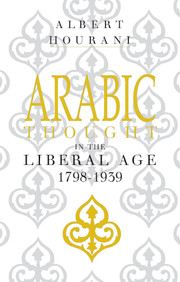Book contents
- Frontmatter
- Contents
- Preface to the 1983 reissue
- Note on Transliteration and References
- I THE ISLAMIC STATE
- II THE OTTOMAN EMPIRE
- III FIRST VIEWS OF EUROPE
- IV THE FIRST GENERATION: TAHTAWI, KHAYR AL-DIN, AND BUSTANI
- V JAMAL AL-DIN AL-AFGHANI
- VI MUHAMMAD ‘ABDUH
- VII ‘ABDUH'S EGYPTIAN DISCIPLES: ISLAM AND MODERN CIVILIZATION
- VIII EGYPTIAN NATIONALISM
- IX RASHID RIDA
- X CHRISTIAN SECULARISTS: SHUMAYYIL AND ANTUN
- XI ARAB NATIONALISM
- XII TAHA HUSAYN
- XIII EPILOGUE: PAST AND FUTURE
- Select Bibliography
- Index
- Frontmatter
- Contents
- Preface to the 1983 reissue
- Note on Transliteration and References
- I THE ISLAMIC STATE
- II THE OTTOMAN EMPIRE
- III FIRST VIEWS OF EUROPE
- IV THE FIRST GENERATION: TAHTAWI, KHAYR AL-DIN, AND BUSTANI
- V JAMAL AL-DIN AL-AFGHANI
- VI MUHAMMAD ‘ABDUH
- VII ‘ABDUH'S EGYPTIAN DISCIPLES: ISLAM AND MODERN CIVILIZATION
- VIII EGYPTIAN NATIONALISM
- IX RASHID RIDA
- X CHRISTIAN SECULARISTS: SHUMAYYIL AND ANTUN
- XI ARAB NATIONALISM
- XII TAHA HUSAYN
- XIII EPILOGUE: PAST AND FUTURE
- Select Bibliography
- Index
Summary
From time to time in the life of al-Afghani we have come upon the figure of Muhammad ‘Abduh, the disciple and collaborator moving closely in his wake. But ‘Abduh did not remain all his life a pupil of al-Afghani, nor were the years of their collaboration the most fruitful of his career. He was to become a more systematic thinker than his master and have a more lasting influence on the Muslim mind, not only in Egypt but far beyond. His teaching was in the end to be rejected by many of those to whom he addressed himself, but remained working beneath the surface, the unacknowledged basis of the religious ideas of the ordinary educated Muslim.
His origin was very different from that of al-Afghani. Al-Afghani came from some distant place not to be determined with certainty, and passed like a meteor from one country to another; ‘Abduh was firmly rooted in an ordinary family of the country where his main work was to be done. He was born in 1849 in a village of the Egyptian delta, into a family belonging to what has been the creative class of modern Egypt: the village families of some local standing and with a tradition of learning and piety. His father was perhaps of distant Turkish origin, his mother of an Arab family claiming descent from one of the early heroes of Islam.
- Type
- Chapter
- Information
- Arabic Thought in the Liberal Age 1798–1939 , pp. 130 - 160Publisher: Cambridge University PressPrint publication year: 1983
- 1
- Cited by



